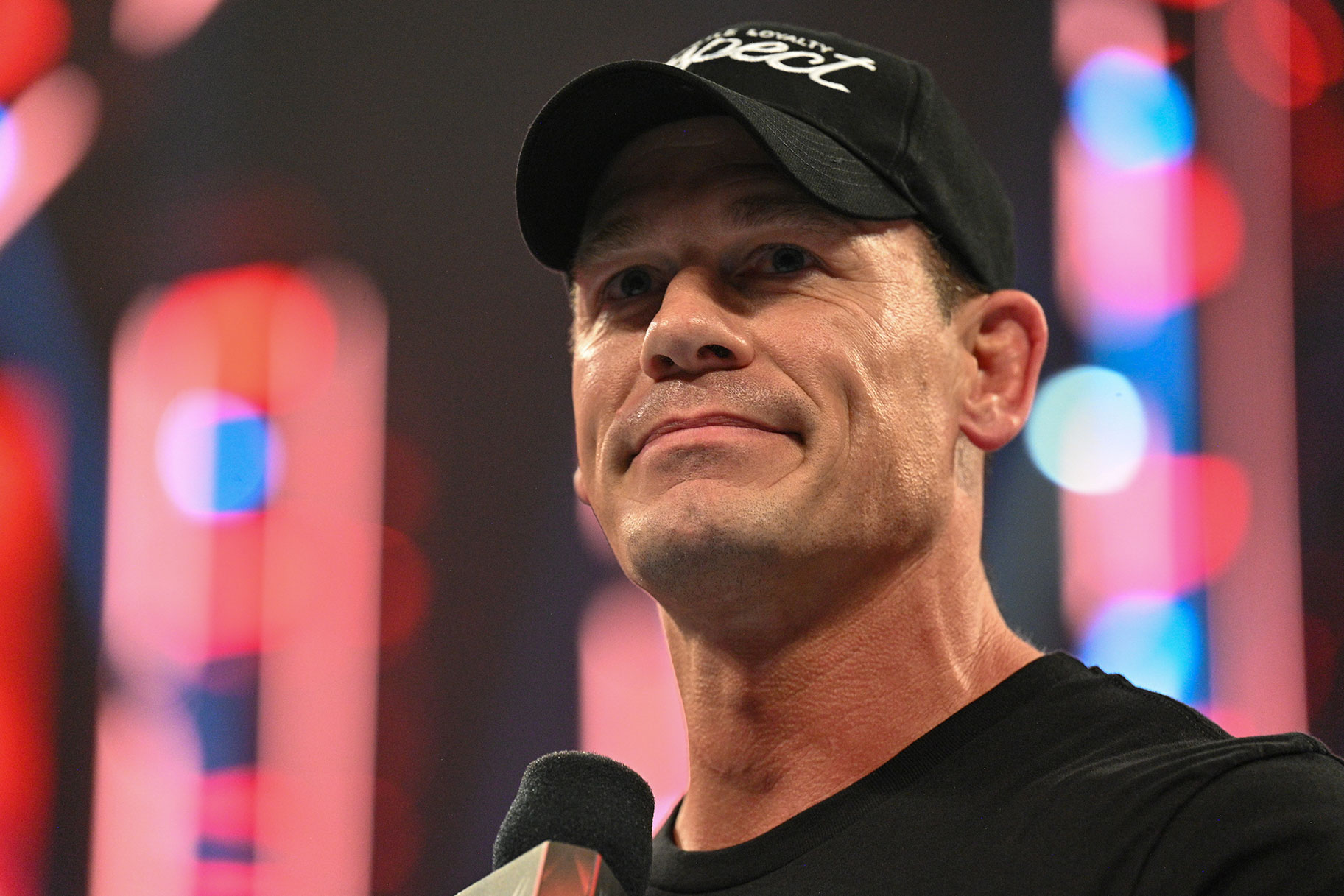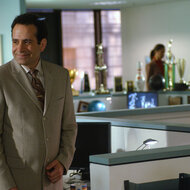From Ring To Screen: The Evolution Of John Cena’s Superstardom And Beyond
From 16-time World Champion to "Peacemaker," John Cena has come a long way since he first stepped into the WWE ring.

Chances are if you Googled "supernova," you’d find the chiseled, dimpled cheeks of WWE’s golden boy and 16-time World Champion John Cena staring back at you. Standing at a formidable 6’2" and weighing in at 275 pounds, Cena owns an orbit few could ever imagine possible. However, despite his impressive build and devilishly handsome looks, the titan behind the beguilingly perfect persona he’s mastered for the WWE over his 20-year-long career wasn’t born overnight. Sure, it took years of grueling physical punishment, forged through innumerable hours of pumping steel in sweaty gyms; no one can forget the countless injuries that would drive mortal men into pain-induced nightmares.
But behind the brawn, most of all, his journey demanded the brains. Developing such stagemanship calls for a sense of mental acuity in which no simple calculus solves the equation. It’s a myriad of gifts all rolled into one inexplicable identity. What Cena has, and what he continues to cultivate, is his own patented blend of the “secret sauce.” No, Colonel Sanders, I’m not talking about some paltry blend of 11 herbs and spices. I’m talking about something bigger; something bolder; something many of us paltry earthlings could only dream of. I’m talking about the highly sought-after and requisite, cerebral skill of crafting a character that would not only cement him as a legend in the ring but propel him straight into the hellmouth of the entertainment lion’s den: Hollywood.
From wrestling’s Golden Age to the Attitude Era and beyond, it’s been a natural progression for ringleaders to transition from ring to screen. With the media juggernaut continuously amplifying their fame, who could blame them? Hulk Hogan did what he could, but sadly, "Mr. Nanny" (1993) lacked the heart it so very much tried to convey. When it came to Jesse Ventura in "Predator" (1989), audiences yearned to see his character “Blain” shredded by the eponymous villain. The Big Show’s role in "The Waterboy" (1998); Chris Jericho in "MacGruber" (2010); and André the Giant in "The Princess Bride" (1987) — the list goes on.
Flash forward a couple decades and "Rowdy" Roddy Piper played Da Maniac perfectly in "It's Always Sunny in Philadelphia," and despite Channing Tatum’s bonkers, swag-a-licious moves, Kevin Nash’s glutes nearly stole the show in "Magic Mike" (2012). Aside from Dwayne "The Rock" Johnson and now Dave Bautista, both of whom deserve their own accolades in the pantheon of brawlers-turned-thespians, John Cena is quickly carving his square jaw into the Mount Rushmore of Hollywood’s elite.
Whether you believe in fate or destiny, it’s hard to deny from some of Cena’s most memorable matches that the writing wasn’t always on the wall. In his 2006 "Unforgiven" match against The Edge, Cena displayed a layered, blood-curdling degree of aggression that made it impossible for viewers to look away. During his turn in the 2011 "Money in the Bank" match against the hometown star CM Punk, Cena’s tour de force performance offered audiences a rare and gutsy blend of heart mixed with intensity all the while illustrating how gifted of a warrior he was when it came to his masterful artistry and technicality.
Still, Cena needed to convince the rest of the non-wrestling world of who the man behind the muscles truly was by embracing the hero’s flame burning within: enter 2012’s "Extreme Rules." In one of the most fundamental, David-versus-Goliath matches ever, which pit the smaller Cena against Brock "The Beast Incarnate" Lesnar, Cena proved it’s truly not how big the dog in the fight is, it’s how big the fight in the dog is. Despite his uncanny power that dominated most of the match, Lesnar allowed his arrogance to permeate the ring, providing Cena the small, vital window he needed.
With Lesnar working the crowd as he placed a pair of steps in the middle of the ring for an airborne finishing move, Cena surreptitiously wrapped his fist in the cold comfort of a steel chain. As the monstrous Lesnar took flight, Cena crushed him with an earth-shattering strike before delivering his signature Attitude Adjustment to win the match. Cena won over the boisterous Chicago audience with a genuinely profound and gritty show never to be forgotten while also declaring for the entire world to hear that he wasn’t just a champion — he was greatness embodied.
Though he had gifted the silver screen with heroic takes as a jaded ex-soldier in "The Marine" (2006) and as an uncompromising, newly-minted detective on a mission in "12 Rounds" (2009), it wasn’t until "Trainwreck" (2015) where his scene-stealing comedy chops alongside Amy Schumer truly provided a glimpse of the spectrum of his raw talent. He was funny; he was vulnerable; but most importantly, he was affable in the throes of dialogue that, for any other person, could’ve been flat-out bizarre. But not for Cena, aka “Steven” – the film’s sensitive teddy bear who was just looking for his "cross-fit queen."
The Champ again put his talent to the test with the hit animated film "Ferdinand" (2017) — yes, a children’s animated story makes the list, and don’t knock it until you see it! Though he clearly never appeared on screen in human form, it’s hard to ignore how perfect Cena was for the role, pouring every ounce of creativity and soul into the tragically misunderstood titular character — a fascinating happenstance that one can’t help but see the potential parallels to in Cena’s real life as the WWE’s former bone-crunching winner (did I mentioned he benched-pressed 463 pounds at the tender age of 38?).
If that weren’t enough, he somehow managed to upstage Optimus Prime and Pamela Adlon (sorry Pam) in "Bumblebee" (2018), providing depth to what could’ve been a one-dimensional military trope in the hands of any other talent, but not Cena – no siree! As the Hollywood lore goes, director Travis Knight confirmed that it was Cena’s idea to develop his character’s backstory, calling Cena’s commitment to his craft a “revelation.”
Clearly, when it comes to his preparation and thoughtfulness as he pursues his acting career, with Cena, there was always something more than meets the eye.
But his toughest test would come in his next three outings. In "F9:The Fast Saga" (2021), not only did he have to find room in the star-packed ninth installment of Universal Pictures’ beloved franchise amongst a host of well-crafted characters — played by prestigious stars such as Oscar-winner Charlize Theron — as Vin Diesel’s character’s brother, “Jakob,” he had to do something we only saw glimpses of in his past films: return to his roots. Though labeled as the WWE’s golden boy, when it came to being a Toretto in "F9," he played the baddie to a tee before his character’s true intentions manifested, swinging the pendulum of his story arc to the completely opposite side. Cena’s character’s heroic twist proved, yet again, the range of his vast talents.
Finally, he made the necessary evolutionary jump to merge his comedic and dramatic chops with his innate action-star abilities. The results emerged in the form of Peacemaker in James Gunn’s "The Suicide Squad" (2021). Such a dynamic amalgamation delivered gut-busting laughs to gut-wrenching tears and literally everything in between, including a well-framed shot of some form-fitting tighty-whities. From the moment he donned his absurdly shiny helmet alongside the always brilliant Idris Elba, it was evident that Cena clearly integrated everything he had learned over the course of his illustrious career — both in the ring and on the screen — into the role. He was made to play the snarky, wise-cracking antihero just as much as the role was made for him. Peacemaker's sanctimonious sense of duty saw him not only traverse the gamut of hero to villain in the film, but Cena also carried his character’s arc over into his own standalone "Peacemaker" (2022) series. It was here, between the walls of each five-act episode, where he transcended probably even what he too thought was possible, returning his character to a harmonious balance of heart, soul, and determination in what can only be deemed triumphant.
It's innately a Herculean task to try to define such a compelling and potent performer like Cena whose brains, wit, charm, spirit, and a myriad of other intangible identifiers all coalesce to form a generational talent the likes of which is rarely, if ever, seen. It’s exhausting just to think about how much he could realistically achieve in not only the entertainment realm, but in life in general. Many of his former WWE gladiator brethren often regale the media with stories about Cena’s philanthropic contributions, and nothing could be purer of heart than him meeting with Misha Rohozhyn, a 19-year-old Cena superfan with Down syndrome who recently escaped from Mariupol, Ukraine, after Russian forces lay siege to the city and destroyed his home. With a rare three days off from work, Cena hopped on a plane and met Misha in Amsterdam where other Ukrainian refugees like Misha and his mother were staying. There, an ordinary day turned extraordinary, but for Cena, it was just John being John, loving the chance to brighten a youth’s spirit and do good in a world that lately seems so bad.
When it comes to Cena, maybe it’s time we stop trying to pigeonhole him with lame qualifiers or fit him into some arbitrary archetype of what we think he should be. Maybe it’s time we just sit back and enjoy the man for whom he is.


